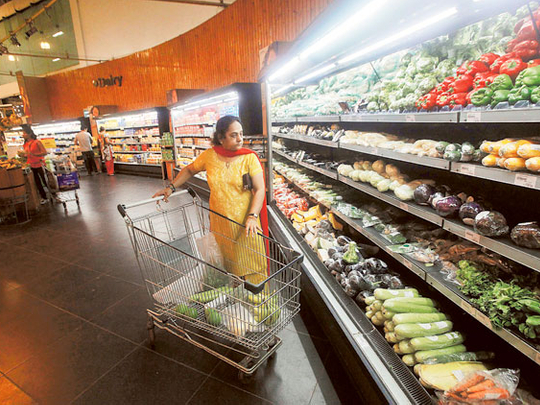
New Delhi: India’s government approved plans to allow foreign retailers to open outlets that sell more than one brand, opening up a $505 billion (Dh1.8 trillion) market to such companies as Wal-Mart and Carrefour.
The government said Friday that overseas companies must put half of their investment in infrastructure such as processing, manufacturing, storage, warehouses and packaging.
“India is a big opportunity, of that there is no doubt,” Arun Kejriwal, director of advisory firm Kejriwal Research & Investment Services said by phone. “We have the world’s second-largest population, we have a fairly large middle class, so we become an attractive destination for any sort of organised retailing.”
The announcement came after political opposition led the government in December to reverse a decision to allow overseas companies to own 51 per cent of Indian retail stores. Global retailers have sought to enter the world’s second-most populous country to tap a market that’s estimated to grow to $725 billion by 2017, from $505 billion in 2012, according to Technopak Advisors.
Calling it an “important first step” for India to further liberalise the retail industry, Wal-Mart said it is willing to invest in infrastructure that will help lower product prices, reduce wastage of farm produce and ease supply-side inflation.
Infrastructure Investment
“We are grateful that the government has realised and appreciated the value that we will bring to strengthen the Indian economy,” Raj Jain, president of Wal-Mart India, said in an e-mailed statement.
Foreign-funded outlets are only allowed to set up in states permitted by the local governments and can only be opened in cities with a population of more than one million people, according to the statement.
In states that do not have cities of more than 1 million people, the state government can choose where to allow stores.
The Bank of New York Mellon India ADR Index climbed to the highest level in five months and American depositary receipts of ICICI Bank., the nation’s biggest private lender, rallied.
Indian retailers including Pantaloon Retail, the country’s largest operator of supermarkets, surged in Mumbai Friday. Pantaloon rose 7.1 per cent to 157.90 rupees, the most since June 6, while Shopper’s Stop added 1.2 per cent and Trent, which has a franchise agreement with Tesco climbed 3 per cent.
Local benefit
Indian companies may benefit from looser rules because the action could encourage partnerships with international businesses. Foreign investment will help ease fundraising concerns for Indian companies that have been “bleeding money,” said Arvind Singhal, chairman of Technopak Advisors.
Shoppers’ Stop will consider teaming up with a foreign partner to expand its hypermarkets as it needs global technology, sourcing and a large amount of funding, Govind Shrikhande, managing director at Shoppers Stop, said by phone.
Foreign companies are currently permitted to invest in supply chains and wholesale stores, which sell to local retailers and businesses. In January, India allowed overseas companies full ownership of stores selling a single brand, letting the likes of Starbucks Corp. and Ikea operate without a local partner. Ownership had been limited to 51 percent.
The government’s last attempt to open the industry to overseas investment was met with protests from the opposition and its allies, which forced repeated adjournments of parliamentary proceedings. Prime Minister Manmohan Singh pledged in December that he would urge the easing of restrictions in an effort to boost the country’s economic growth.
Singh has a target to narrow the budget deficit to 5.1 per cent of gross domestic product in the 12 months ending March 2013 from 5.8 per cent a year earlier. Asia’s third-largest economy grew 5.5 per cent in the three months ended June 30 after expanding 5.3 per cent in the previous quarter, the least in three years.
ICICI Bank gained 5 per cent to $38.19 in New York, the highest since February 22. Tata Motors, the owner of Jaguar Land Rover, increased 6.1 per cent, the most in three months, to $25.41. Sterlite Industries, the nation’s largest copper producer, surged the most since June 6, jumping 7.7 per cent to $7.68.
The iPath MSCI India Index ETN, an exchange-traded note that tracks India’s equity market, gained 3.6 per cent to $56.29, the highest since April 12. India’s benchmark BSE India Sensitive Index, or Sensex, rose 2.5 per cent to 18,464.27 Friday, its highest close since July 26, 2011.
“The real issue is not the announcement but the implementation of this policy,” Walter Rossini, a fund manager with Aletti Gestielle, said by phone from Milan Friday. “We have seen this noise in the past but maybe this time it is different.”












